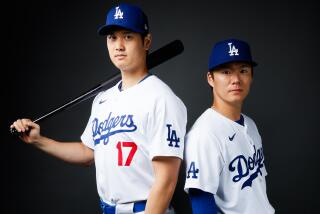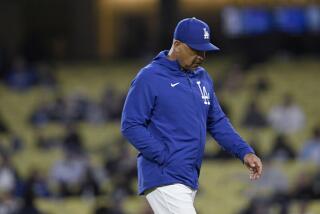Moreland Feels Right at Home : And Padres Take to the Ex-Cub With the Big Salary
- Share via
YUMA, Ariz. — Anybody who ever knew anything about Keith Moreland wouldn’t have been surprised. He had been bunking in this barren outpost--living among the Yumans--for fewer than 10 days. He had been a Padre less than two weeks.
And already he was a presence. In and around the batting cage, he was observing his new teammates and offering hitting advice. During the intrasquad games, he sat in a folding chair under the sun next to batting coach Amos Otis. From there he watched and talked hitting some more.
What was surprising was the immediate reaction the Padres had to him.
The Feb. 12 trade that sent pitchers Goose Gossage and Ray Hayward to the Cubs in exchange for Moreland and infielder Mike Brumley meant that Moreland was now the highest-paid player on the team. He was also the pal and former teammate of Manager Larry Bowa.
It didn’t help on the day of the trade when Alan Hendricks, Moreland’s Houston-based agent, proclaimed: “Nothing against any of the Padres, but some of their leaders are not so high-key and assertive. Moreland is both of those things.”
To the pitchers who had looked up to Gossage, Moreland could have been a convenient target/symbol of Gossage’s hasty departure. To the regulars unhappy with their salary arrangements--and there were more than a few--the $2.5 million Moreland will earn over 1988 and 1989 could have been a painful reminder of the money they weren’t going to make during that same period.
To the sizable number of blacks and Latins on the Padres’ major league roster, Moreland could have represented something even more threatening. After all, he had once answered to “Bobby Keith Moreland,” when he was one of Darrell Royal’s meanest tacklers on the University of Texas Longhorn defense. He still spoke with a slight drawl. And when he got angry, his face and, yes, his neck would redden.
Fortunately, stereotypes don’t feed that easily in the culture medium that is professional sports. The Padres celebrated Moreland’s arrival.
They sought him out during batting practice. They came by his locker to talk fishing. They watched him finish dead last in Bowa’s pre-practice two-mile run and realized that he wasn’t apple-polisher and that he meant it when he scoffed at suggestions that he would be Bowa’s clubhouse information pipeline.
Then Tony Gwynn made it official.
Gwynn led the National League in hitting last year with a career-high .370 average. He also stole a career-high 56 bases hitting No. 2 in the lineup. Moreland probably will hit No. 3 and benefit more than anybody from Gwynn’s high on-base percentage. But it was Gwynn who was excited by the trade.
“I’ll get to score more runs,” Gwynn said.
More important, Gwynn added, “Keith Moreland doesn’t mind getting on someone’s case. And he doesn’t mind pulling a practical joke here and there. That’s something this club has desperately needed the last couple of years. We needed a guy like that.”
They needed, if you will, a guy with a sense of Yuma.
Even more important, Gwynn said, “we’ve got guys talking baseball away from the park now. That didn’t happen too much last year. Keith is a really, really smart hitter. I know some guys here who have talked to him and have already picked up a few tidbits.”
For his part, Moreland downplayed the leadership role the Padres were so eager to bestow upon him.
“My job’s the same as it’s always been,” he said. “I just go out and play. That isn’t any different than it was in Chicago. I don’t look at things in terms of roles. I just go out and play as hard as I can and try to win.
“But if someone’s not doing their job, I’ll say something about it. I would have done the same thing five years ago. But as far as saying, ‘We gotta do this because that guy wants it done like that’--that kind of thing is not my job.”
The 27 home runs Moreland hit for a miserable Cub team last year were seven more than in any of his previous nine major league seasons. He will turn 34 in May. More than once, Ted Williams has listed Moreland among his favorite active hitters. And Moreland is just two seasons removed from a year in which he led the major leagues in hits with two out and runners in scoring position (33). Before 1985, the last time anybody had surpassed that number in either league was 1979.
But he has never played in an All-Star Game. He is slow afoot (though he did steal 12 bases in 1985, his best all-around year). And his God-given defensive ability will never convert nonbelievers. Bowa hopes to use him in left field. But Moreland also can fill in at third base, where he played 150 games last year, and he has caught and played first.
Two springs ago, Jimmy Piersall, the Cubs’ special defensive assistant coach, used a particularly offensive off-color epithet to describe Moreland’s defense. Moreland’s response the next time he saw the volatile Piersall was equally off-color.
“I play with emotion,” Moreland says. Piersall does everything with emotion. They were bound to clash. Anthony Perkins played Piersall in the movie “Fear Strikes Out.” If they ever make a movie of Moreland’s life, the word fear will not be in the title.
When Andre Dawson arrived in Chicago last year, Moreland moved from right field to third base. He had no choice in the matter. And he suffered. His 28 errors were a major league high at that position. For a time, it even affected his hitting.
“But it didn’t bother his confidence,” says Cub shortstop Shawon Dunston. “He kept telling me, ‘I can hit, Shawon. My numbers will be there.’ ” Along with the 27 homers, Moreland finished with 29 doubles and 88 runs batted in.
Before the switch to third, longtime Wrigley Field observers say nobody worked harder than Moreland to learn the vagaries of playing right field there. Right field at Wrigley Field is a place where the sun, the wind and the ivy conspire to make grown men wish they were gardening for a living. Lou Brock became a former Cub right fielder soon after a fly ball hit him in the head. It wasn’t until he got to St. Louis that Brock began his earnest flirtation with the Hall of Fame.
Nor will Moreland soon miss the place Ernie Banks still calls “the friendly confines,” even though Gwynn says home runs come more easily there. The problem, says Moreland, wasn’t the sun, the wind or the wilting August humidity. It was the constant adjustment the Cubs had to make to their biological body clocks every time they went from day baseball at home to night baseball on the road. Or vice versa.
“The Cubs needed lights,” Moreland says. And barring more courtroom fights, the Cubs will play a limited night schedule at home this season for the first time in their storied history. “I really and truly enjoyed being at home with my family in the evenings,” Moreland says. “That part was like an everyday job. But I didn’t like the fact that you had to play a different time schedule than everybody else did.”
And he wasn’t so sure about how comfortable he felt playing for a team owned by one of the newspapers that covered it.
“I think the (Chicago) Tribune owns everything but the Chicago Sun-Times,” he said. “The Tribune owns the club, the TV station (cable superstation WGN) and the newspaper.
“They produce fans by doing that because they have everything in the world right at their fingertips. They’ve got the oldest ballpark--a park everybody wants to see. And they’ve got national cable TV. And the paper. It’s a moneymaker.”
What the Cubs haven’t had is a National League pennant since 1945 or a World Series championship since 1908. They don’t have Moreland anymore, either.
“I never thought I played bad enough that a team would want to trade me,” he said. “But I did. I guess.”
Nor did Moreland understand the chain of events that led to the resignation of General Manager Dallas Green. Green had been one of Moreland’s biggest boosters ever since they were together with Bowa in Philadelphia.
“I guarantee Dallas Green will surface in this game again and be a dominant force,” Moreland says. But Green’s departure probably hastened the talks that led to Moreland’s arrival in San Diego.
Bowa says Moreland’s role with the Padres will be “to drive in runs.” In the next breath Bowa adds: “If they’re out there . . . They gotta be out there.”
Gwynn should take care of that. The success of center fielder Stanley Jefferson, batting in the lead-off spot, also will have a direct influence on the kinds of pitches Moreland sees. If Jefferson and Gwynn are on base a lot, pitchers won’t be able to work around Moreland.
If Gwynn and Jefferson are stealing a lot of bases, pitchers will want to throw Moreland fastballs. But if Moreland is seeing the ball well, they won’t want to throw him fastballs. Worse for opponents, Moreland’s power is to all fields.
All of which helps explain why the Padres wanted Moreland so much. The other side of the coin is Moreland’s defense. It’s acceptable if he can get to the ball. But his range is well below the major league average. Jefferson will have to get to a lot of balls in the left-center field power alley because Moreland will provide little assistance there.
Moreland’s critics say he is out of his league. They say he belongs in the American, where the only glove a designated hitter needs is the kind you tuck in your back pocket after a bases-clearing double.
“If he could run, he’d be a great player,” Jim Frey said when he managed Moreland in Chicago.
Moreland knows that “I’m just a player,” he says. “I get paid to play baseball. And I’m very happy to be here.”
The Padres sensed that right away. They gravitated toward him.
“If you want to get better, you have to put some extra time in,” Gwynn says. “It’s not gonna happen over night. Or by reading books.”
Keith Moreland has made a career of putting in extra time.
More to Read
Go beyond the scoreboard
Get the latest on L.A.'s teams in the daily Sports Report newsletter.
You may occasionally receive promotional content from the Los Angeles Times.










